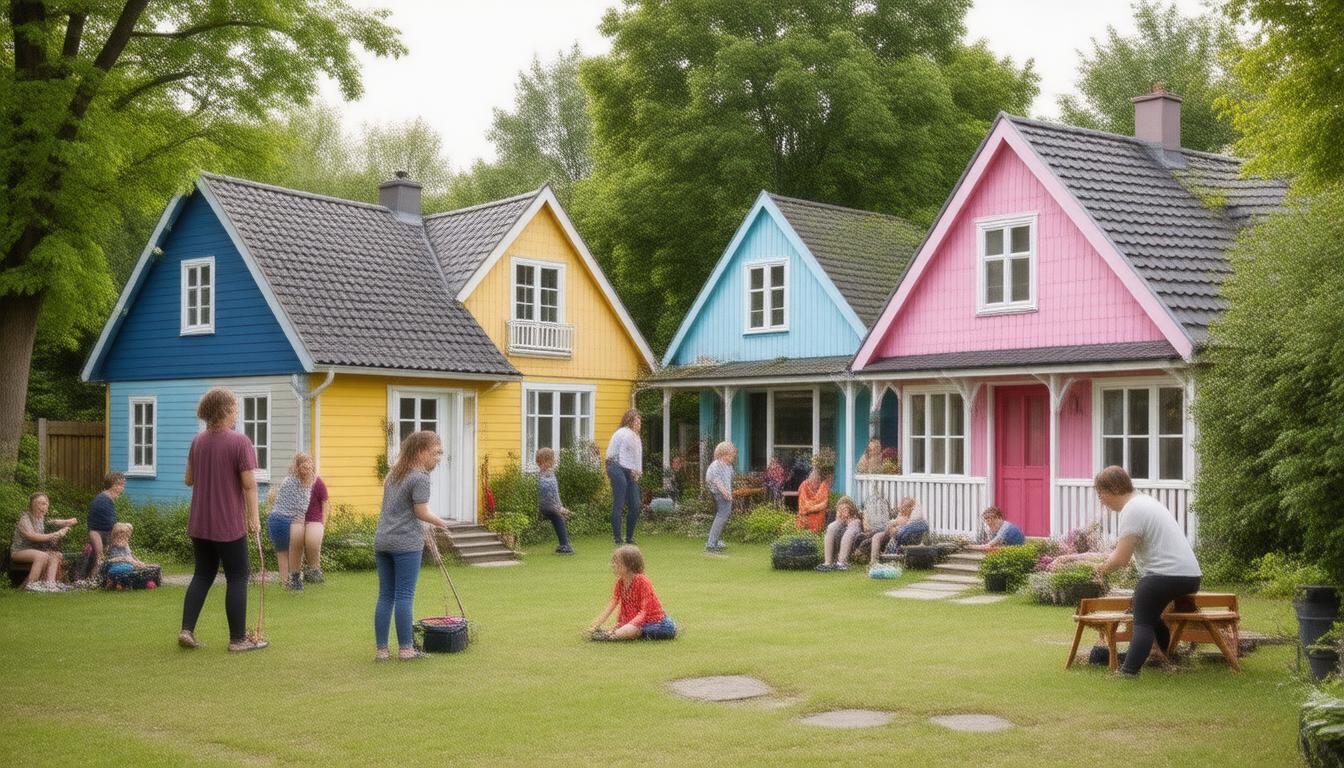Housing co-operatives represent an innovative model of community living, prioritising affordability, sustainability, and a strong sense of togetherness. This guide aims to explore the concept of housing co-operatives, shedding light on their operational framework, potential benefits, challenges, and their evolving role in the UK housing landscape. As alternatives to traditional housing options become increasingly essential in addressing pressing housing issues, understanding housing co-operatives can empower individuals seeking a collaborative and community-focused approach to living.
Key Takeaways
- A housing co-operative is a collective community model where members share ownership and responsibilities.
- Living in a housing co-operative can lead to reduced housing costs and increased social support.
- Housing co-operatives offer a unique approach to communal living, fostering strong community bonds.
- Joining a co-operative involves participating in decision-making processes and contributing to the community.
- The future of housing co-operatives in the UK is promising as more people seek alternative housing solutions.
What is a Housing Co-Operative?
A housing co-operative is a collective model of housing where residents come together to own and manage their accommodation collaboratively. Unlike traditional rental arrangements, in a housing co-operative, members are not merely tenants; instead, they hold shares in the co-operative, which grants them specific rights and responsibilities regarding the operation of their living environment (Rosenberg, 2021). This model fosters a sense of community and encourages active participation in decision-making processes related to maintenance, management, and governance of the properties. Co-operatives can take various forms, including limited equity, where members benefit from lower costs but may face restrictions on profit from sales, or market rate co-ops, allowing for more flexible financial arrangements. The overarching aim of a housing co-operative is to provide affordable, stable housing while promoting social interaction and cooperative values among its members (LFS, 2020). As urban housing challenges continue to escalate, housing co-operatives present a sustainable alternative that addresses both affordability and community needs.
Key Benefits of Living in a Housing Co-Operative
Housing co-operatives offer a unique living arrangement that promotes community engagement and shared responsibility among residents. One of the key benefits of living in a housing co-operative is the sense of belonging it cultivates, as it encourages interaction and cooperation among members. This collective approach not only fosters a supportive environment, but also empowers residents to make decisions about their living conditions, which can lead to tailored solutions that better suit their needs (Baker, 2019). Additionally, housing co-operatives often have lower housing costs compared to traditional rental or ownership models, as profits are reinvested into the community rather than distributed to shareholders (Smith, 2021). Furthermore, living in a housing co-operative can promote sustainability, as many co-ops implement eco-friendly practices and focus on local sourcing to benefit both the environment and the local economy (Jones, 2020). Overall, housing co-operatives present a viable alternative to conventional housing options, enriching the lives of their members through community, affordability, and sustainability.
‘Alone we can do so little; together we can do so much.’ – Helen Keller
How Housing Co-Operatives Work
Housing co-operatives provide an innovative approach to housing management, enabling communities to collectively own and manage their living spaces. At the core of any housing co-operative is the principle of democratic control; members have equal voting rights in decision-making processes, which fosters a strong sense of community and collaboration. Unlike traditional rental agreements, housing co-operatives allow members to purchase shares in the co-op, granting them access to a property while also providing them with a stake in the cooperative’s governance and operations. Funding for housing co-operatives can come from a mix of member contributions, government grants, and loans from financial institutions, making them accessible to a wider range of people. Members are often involved in various committees that focus on aspects like maintenance, finance, and community activities, ensuring that their individual needs and communal goals are met (Parker, 2021). As these co-operatives operate under a not-for-profit philosophy, the savings made through collective buying and management strategies can be reinvested into improving living conditions, further enhancing the quality of life for members (Co-operative Housing International, 2022). This model promotes affordability, stability, and often leads to lasting relationships within the community, showcasing the effectiveness and resilience of the housing co-operative framework.
Getting Involved: Joining a Housing Co-Operative
Joining a housing co-operative can be a rewarding way to secure affordable housing while fostering a sense of community. A housing co-operative is typically a group of individuals who come together to collectively own and manage their living space, sharing responsibilities and decision-making processes (Mullins, 2018). To get started, prospective members should first research local housing co-operatives to understand their specific structures, values, and available accommodations. Many co-operatives require potential members to attend introductory meetings or open houses, allowing them to explore the community dynamics and learn about the co-operative’s policies. Financial considerations are also crucial; applicants may need to demonstrate their ability to contribute to the co-operative’s budget, which involves paying a monthly fee covering housing expenses and shared costs (Krentz, 2021). Furthermore, it is vital to be prepared for community commitments, as involvement often includes participating in meetings, maintenance work, and other communal activities. Ultimately, joining a housing co-operative not only provides housing stability but also fosters valuable relationships with neighbours, enhancing the living experience for all members.
Challenges and Considerations
Housing co-operatives represent a form of collective housing where residents have an ownership stake in the management and maintenance of their living environment. However, there are several challenges and considerations linked with this model. First, the initial formation of a housing co-operative can be complex, requiring substantial legal and financial knowledge to navigate the associated responsibilities and regulations (Lee, 2020). Moreover, securing funding and investment can be challenging, as lenders often exhibit hesitance to finance co-operative housing due to perceived risks (Brown, 2021). Operationally, effective decision-making processes and conflict resolution mechanisms are critical, as diverse opinions among members can lead to disputes, potentially disrupting the community ethos that co-operatives aim to foster (Smith et al., 2019). Furthermore, prospective members must demonstrate commitment to the cooperative ethos, which may deter those accustomed to traditional ownership patterns or rental agreements (Johnson & Thompson, 2022). Finally, co-operatives must be proactive in communicating their values and benefits to ensure continued interest and engagement from the broader community (Walker, 2021). Addressing these challenges requires careful planning and a clear strategy, as well as robust governance frameworks to support sustainable operation of housing co-operatives.






